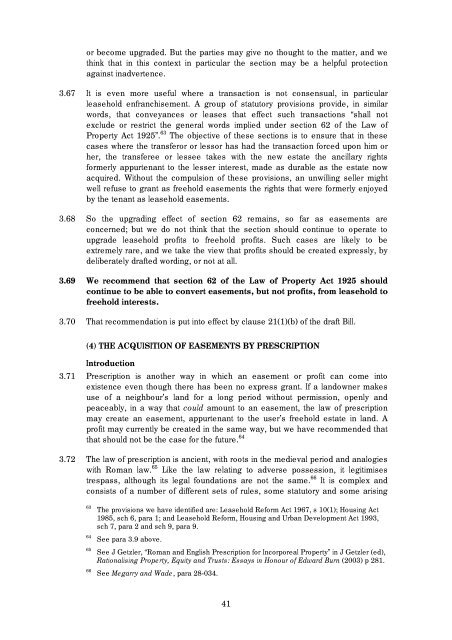Making Land Work: Easements, Covenants and ... - Law Commission
Making Land Work: Easements, Covenants and ... - Law Commission
Making Land Work: Easements, Covenants and ... - Law Commission
Create successful ePaper yourself
Turn your PDF publications into a flip-book with our unique Google optimized e-Paper software.
or become upgraded. But the parties may give no thought to the matter, <strong>and</strong> we<br />
think that in this context in particular the section may be a helpful protection<br />
against inadvertence.<br />
3.67 It is even more useful where a transaction is not consensual, in particular<br />
leasehold enfranchisement. A group of statutory provisions provide, in similar<br />
words, that conveyances or leases that effect such transactions “shall not<br />
exclude or restrict the general words implied under section 62 of the <strong>Law</strong> of<br />
Property Act 1925”. 63 The objective of these sections is to ensure that in these<br />
cases where the transferor or lessor has had the transaction forced upon him or<br />
her, the transferee or lessee takes with the new estate the ancillary rights<br />
formerly appurtenant to the lesser interest, made as durable as the estate now<br />
acquired. Without the compulsion of these provisions, an unwilling seller might<br />
well refuse to grant as freehold easements the rights that were formerly enjoyed<br />
by the tenant as leasehold easements.<br />
3.68 So the upgrading effect of section 62 remains, so far as easements are<br />
concerned; but we do not think that the section should continue to operate to<br />
upgrade leasehold profits to freehold profits. Such cases are likely to be<br />
extremely rare, <strong>and</strong> we take the view that profits should be created expressly, by<br />
deliberately drafted wording, or not at all.<br />
3.69 We recommend that section 62 of the <strong>Law</strong> of Property Act 1925 should<br />
continue to be able to convert easements, but not profits, from leasehold to<br />
freehold interests.<br />
3.70 That recommendation is put into effect by clause 21(1)(b) of the draft Bill.<br />
(4) THE ACQUISITION OF EASEMENTS BY PRESCRIPTION<br />
Introduction<br />
3.71 Prescription is another way in which an easement or profit can come into<br />
existence even though there has been no express grant. If a l<strong>and</strong>owner makes<br />
use of a neighbour’s l<strong>and</strong> for a long period without permission, openly <strong>and</strong><br />
peaceably, in a way that could amount to an easement, the law of prescription<br />
may create an easement, appurtenant to the user’s freehold estate in l<strong>and</strong>. A<br />
profit may currently be created in the same way, but we have recommended that<br />
that should not be the case for the future. 64<br />
3.72 The law of prescription is ancient, with roots in the medieval period <strong>and</strong> analogies<br />
with Roman law. 65 Like the law relating to adverse possession, it legitimises<br />
trespass, although its legal foundations are not the same. 66 It is complex <strong>and</strong><br />
consists of a number of different sets of rules, some statutory <strong>and</strong> some arising<br />
63 The provisions we have identified are: Leasehold Reform Act 1967, s 10(1); Housing Act<br />
1985, sch 6, para 1; <strong>and</strong> Leasehold Reform, Housing <strong>and</strong> Urban Development Act 1993,<br />
sch 7, para 2 <strong>and</strong> sch 9, para 9.<br />
64 See para 3.9 above.<br />
65 See J Getzler, “Roman <strong>and</strong> English Prescription for Incorporeal Property” in J Getzler (ed),<br />
Rationalising Property, Equity <strong>and</strong> Trusts: Essays in Honour of Edward Burn (2003) p 281.<br />
66 See Megarry <strong>and</strong> Wade, para 28-034.<br />
41
















